“This review found no evidence that MHT use either
increases or decreases the risk of dementia in
post-menopausal women. This reinforces…”.1
Umbrella
What may the Hormone Therapy and Dementia Umbrella include?
Depending on the Source (DotS) this Umbrella may include:
- Hormone (Replacement) Therapy H(R)T
- Hormone Medicines
- Hormone Replacement Therapy (HRT)
- Hormone Therapy (HT)
- Hormones
- Medicines for Hormone Replacement Therapy
- Menopausal Hormone Therapy (MHT)
- Menopause Hormone Medicines
- Menopause Medicines
Date
What can it be important to be clear about with hormone therapy (HT) information?
It can be important to be clear about the date of all information including the date of HT information, because this information may have been updated.
Symptoms or Chronic Conditions
What can it also be important to be clear about with HT information?
It can also be important to be clear about whether HT information is about the use of HT for the management of menopausal symptoms such as hot flushes, night sweats and vaginal dryness or for the prevention of chronic conditions such as dementia, cardiovascular disease, cancer and osteoporosis.
Research
What has research found into whether taking oestrogen (as part of HRT) can reduce women’s risk of dementia?
In Hormones and Dementia: Does Hormone Replacement Therapy Reduce Dementia Risk? the (British) Alzheimer’s Society elaborate on:
December 2025
What is the Interpretation of the Menopause Hormone Therapy and Risk of Mild Cognitive Impairment or Dementia: A Systematic Review and Meta-Analysis, commissioned by the World Health Organization and published in December 2025?
The authors’ Interpretation in the Menopause Hormone Therapy and Risk of Mild Cognitive Impairment or Dementia: A Systematic Review and Meta-Analysis is:
 “This review found no evidence that MHT use either increases or decreases the risk of dementia in post-menopausal women. This reinforces current clinical guidance, that MHT prescription should be based on other perceived benefits and risks and not for dementia prevention. High-quality, long-term studies are needed to clarify the role of MHT and dementia risk, particularly regarding formulation, dose, route, timing, and duration of treatment, with a focus on women with premature ovarian insufficiency, early menopause, or mild cognitive impairment”.3
“This review found no evidence that MHT use either increases or decreases the risk of dementia in post-menopausal women. This reinforces current clinical guidance, that MHT prescription should be based on other perceived benefits and risks and not for dementia prevention. High-quality, long-term studies are needed to clarify the role of MHT and dementia risk, particularly regarding formulation, dose, route, timing, and duration of treatment, with a focus on women with premature ovarian insufficiency, early menopause, or mild cognitive impairment”.3Dementia Prevention
Is HT recommended to prevent dementia?
On page three of Menopause and Menopause Hormone Therapy: 1. Who Is MHT For? Who Might Not Need MHT?, the International Menopause Society’s (IMS) Leaflet for Women for World Menopause Day 2024 the IMS note:

HT and Cognitive Health Myths
Where may I find Links related to HT or Menopause Hormone Therapy (MHT) and cognitive health myths?
Your Country may have Links similar to:
Health Care Provider
What if I would like to start HT?
If you would like to start HT, it may be in your best interest to also choose to talk to your health care provider about this.
On page one in Deciding About Hormone Therapy Use the Menopause Society include:
Health Topics A-Z
Where may I find Health Topics A-Z related to Hormone Therapy and Dementia?
In Health Topics A-Z you may find:
Links
Where may I find Links related to Hormone Therapy and Dementia?
Your Country may have Links similar to:
Links
This Links List to third party websites is neither comprehensive nor exhaustive. Inclusion on this Links List does not imply endorsement or recommendation. Non-inclusion on this Links List does not imply non-endorsement or non-recommendation. Third party websites are not under the control of Meno Martha International Menopause Directory. Third party websites may contain explicit medical images and/or sexual references. Please read Meno Martha International Menopause Directory’s Links Policy before proceeding to a Link. Please contact Webmaster if you experience a problem with a Link.New or Updated
- Busting Brain Myths: The Evolving Story of Menopause Hormone Therapy and Cognitive Health [12 December 2025]
- Can Hormone Therapy Protect Your Brain From Alzheimer’s and Dementia? Neuroscientist Explains [September 2025]
- Exclusive: Top Neuroscientist Unveils New Data On Hormone Therapy And Alzheimer’s Risk [October 2025]
- Here Are Eight Ways To Reduce Your Risk of Dementia [28 January 2026]
- Menopause Hormone Therapy and Risk of Mild Cognitive Impairment or Dementia: A Systematic Review and Meta-Analysis [December 2025]
- Menopause Linked To Loss of Grey Matter In the Brain, Poorer Mental Health and Sleep Disturbance [27 January 2026]
- Menopause, Hormone Replacement Therapy, & Dementia [April 2025]
- Menopause, Hormones and the Brain: How Hormone Therapy Could Help Protect Against Alzheimer’s [11 February 2026]
- ACOG Explains: Managing Menopause Symptoms [American College of Obstetricians and Gynecologists]
- About Dementia: What Is Dementia?
- Association Between Menopausal Hormone Therapy and Risk of Neurodegenerative Diseases: Implications for Precision Hormone Therapy
- Bioidentical Hormones: Are They Safer?
- Busting Brain Myths: The Evolving Story of Menopause Hormone Therapy and Cognitive Health
- Can Hormone Therapy Protect Your Brain From Alzheimer’s and Dementia? Neuroscientist Explains
- Concerns About Hormone Therapy and Alzheimer’s Risk | Dr. Lisa Mosconi & Dr. Sharon Malone
- Consumer Video and Podcast Series: 2024 Consumer Videos and Podcasts – Preparing for Your Menopause Health Care Visit
- Consumer Video and Podcast Series: 2025 Consumer Videos and Podcasts – Three Symptoms Linked To Cognitive Complaints
- Could It Be Perimenopause? How Hormones Influence the Brain
- Deciding About Hormone Therapy
- Deciding About Hormone Therapy Use
- Dementia
- Dementia & MHT – Cause or Correlation?
- Dementia vs. Alzheimer’s Disease: Are They The Same?
- Does HRT Prevent Dementia? Or Cause It? Women’s Health Experts Prof Annice Mukherjee and Prof Joyce Harper Have Studied ALL the Research To Cut Through the Hype and Give the Definitive Answer
- Does Menopause Hormone Therapy Increase or Decrease Your Risk of Dementia? Here’s the Science
- Exclusive: Top Neuroscientist Unveils New Data On Hormone Therapy And Alzheimer’s Risk
- Expert Reaction To Observational Study on HRT and Dementia
- Experts Answer Your Menopause Questions In New Video
- FDA Direct: Removing Black Box Warnings for HRT (Part 1/2) [10 November 2025]
- FDA Direct: Removing Black Box Warnings for HRT (Part 2/2) [11 November 2025]
- Find A Menopause Practitioner [United States and Other]
- Find A Practitioner [Australasian Menopause Society i.e. Australia and New Zealand]
- Find Your Nearest BMS Menopause Specialist [British Menopause Society]
- HRT Questions Answered
- HRT Use By Younger Women Linked To Dementia, Study Says. Experts Disagree [CNN Report]
- HRT, Misinformation and Navigating the Menopause Media Minefield With Kaye Adams
- HRT: Benefits and Risks
- Handling Hot Flushes and Night Sweats| Dr Louise Newson
- Here Are Eight Ways To Reduce Your Risk of Dementia
- Hormone Therapy In Postmenopausal Persons: Primary Prevention of Chronic Conditions
- Hormone Therapy and Dementia: Novel Insights
- Hormone Therapy and Dementia: What Do We Know?
- Hormone Therapy for Menopause Linked To Increased Risk of Dementia
- Hormone Therapy for Menopause Symptoms
- Hormone Therapy: Is It Right for You?
- Hormone Therapy and Dementia: Novel Insights
- Hormones and Brain Health | Dr Louise Newson
- Hormones and Dementia Risk
- Hot Flashes: What Can I Do? [+ Video: What Are the Signs and Symptoms of Menopause?]
- Hot Flashes? Night Sweats? Progesterone Can Help Reduce Symptoms of Menopause
- How Food Preferences Are Linked To Cognition and Brain Health – and Why A Balanced Diet Is Superior
- How To Talk To Your Doctor About Midlife Brain Fog

- IMS Past President and Current Treasurer Quoted In CNN Health Article on HRT and Dementia Risk
- Influences of Ovarian Hormones and Hormone Therapy on Alzheimer’s Disease Pathobiology
- International Menopause Society (IMS) Recommendations and Key Messages on Women’s Midlife Health and Menopause
- Is There A Link Between HRT and Cognitive Decline? Research Is Inconclusive
- Lisa Mosconi: Research Is ‘Validating … Women’s Experiences’
- Long-Term Cognitive Effects of Menopausal Hormone Therapy: Findings From the KEEPS Continuation Study
- Managing Menopause Symptoms [+ Video Courtesy: Mayo Clinic News Network]
- Mayo Clinic Minute: Can the MIND Diet Improve Brain Health? [+ Video Courtesy: Mayo Clinic News Network]
- Menopausal Hormone Therapy and Dementia [Editorials]
- Menopausal Hormone Therapy and Dementia: Nationwide, Nested Case-Control Study
- Menopause
- Menopause

- Menopause
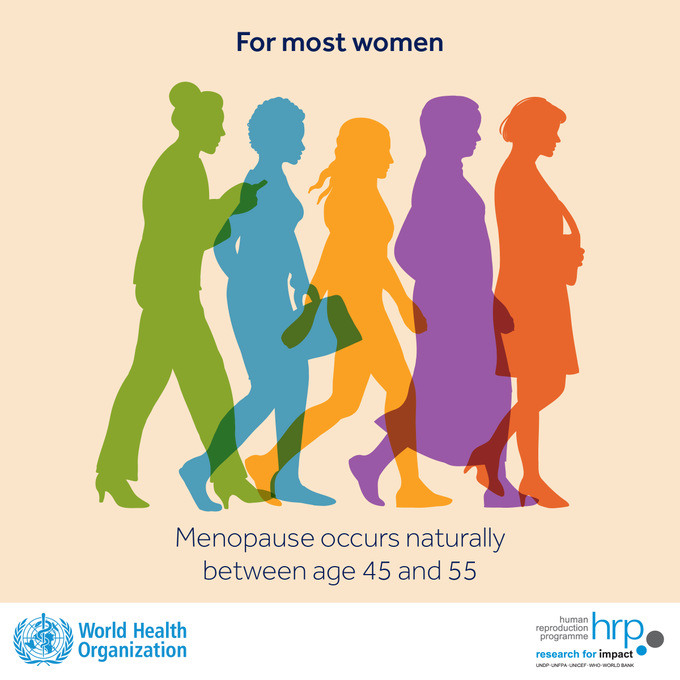
- ‘Menopause Brain’ Is Real. Here’s How Women’s Brains Change In Midlife.
- Menopause Hormone Therapy Significantly Alters Pathophysiological Biomarkers of Alzheimer’s Disease
- Menopause Hormone Therapy and Risk of Mild Cognitive Impairment or Dementia: A Systematic Review and Meta-Analysis
- Menopause Linked To Loss of Grey Matter In the Brain, Poorer Mental Health and Sleep Disturbance
- Menopause Map: Downloadable Resources – My Personal Path Print Tools: Questions for Your Health Care Provider

- Menopause May Unmask Vulnerability To Alzheimer’s Disease, Other Dementias
- Menopause Study: How Does Hormone Replacement Therapy Impact Dementia Risk?
- Menopause Symptoms May Be Critical To Understanding Alzheimer’s Disease Risk In Women
- Menopause Symptoms: Mayo Clinic Expert Outlines Hormone and Nonhormonal Therapies
- Menopause Treatments: What Works, What Doesn’t
- Menopause, Hormone Replacement Therapy, & Dementia
- Menopause, Hormones and the Brain: How Hormone Therapy Could Help Protect Against Alzheimer’s
- Menopause: HRT’s Brain-Protecting Effect May Be Overstated
- Menopause: Identification and Management [NICE Guideline Published: 12 November 2015 Last Updated: 07 November 2024]

- Menopause: Identification and Management: NICE Guideline [NG23] [07 November 2024]
- Menopause: Things You Can Do
- Mosconi: ‘Menopause Is A Neurologically Active State’
- Navigating Menopause Care Resource Guide
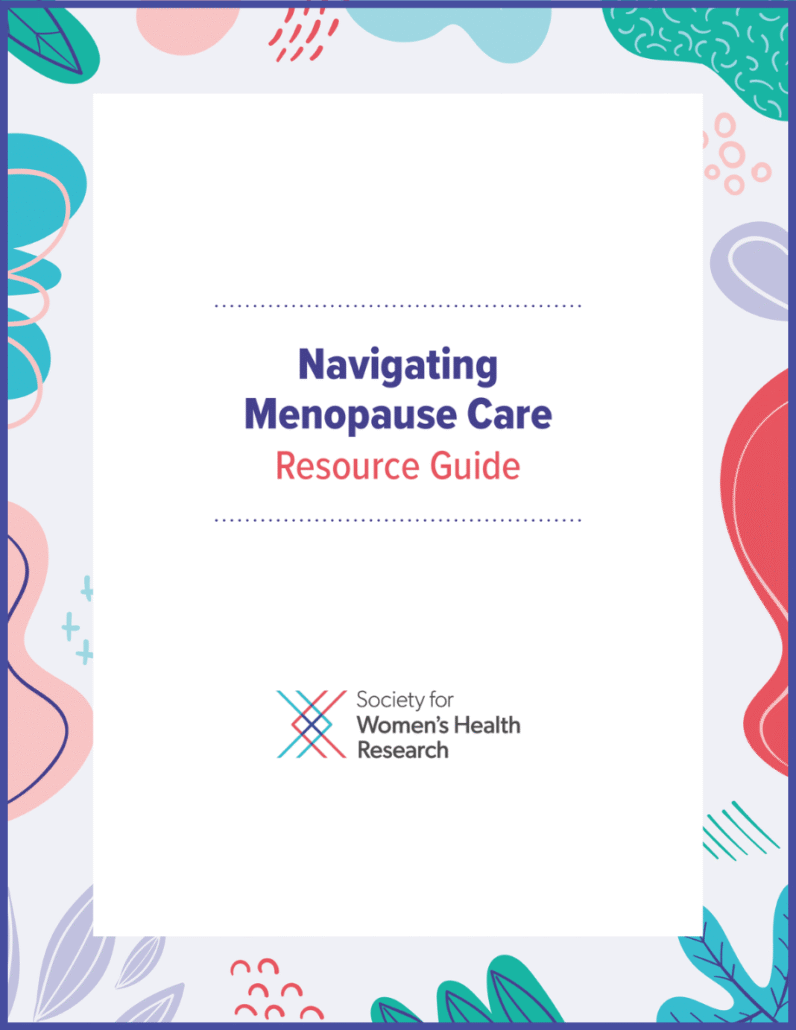
- Nonhormone Treatments for Hot Flashes and Night Sweats
- Perimenopause
- Perimenopause and Menopause Checklist: Translated Checklists
- Perimenopause and Menopause Symptom Checklist

- Science In 5: Episode #122 – Dementia
- Shedding Light on the Menopause Experience and Demystifying Treatment
- Staying Healthy During and After Menopause
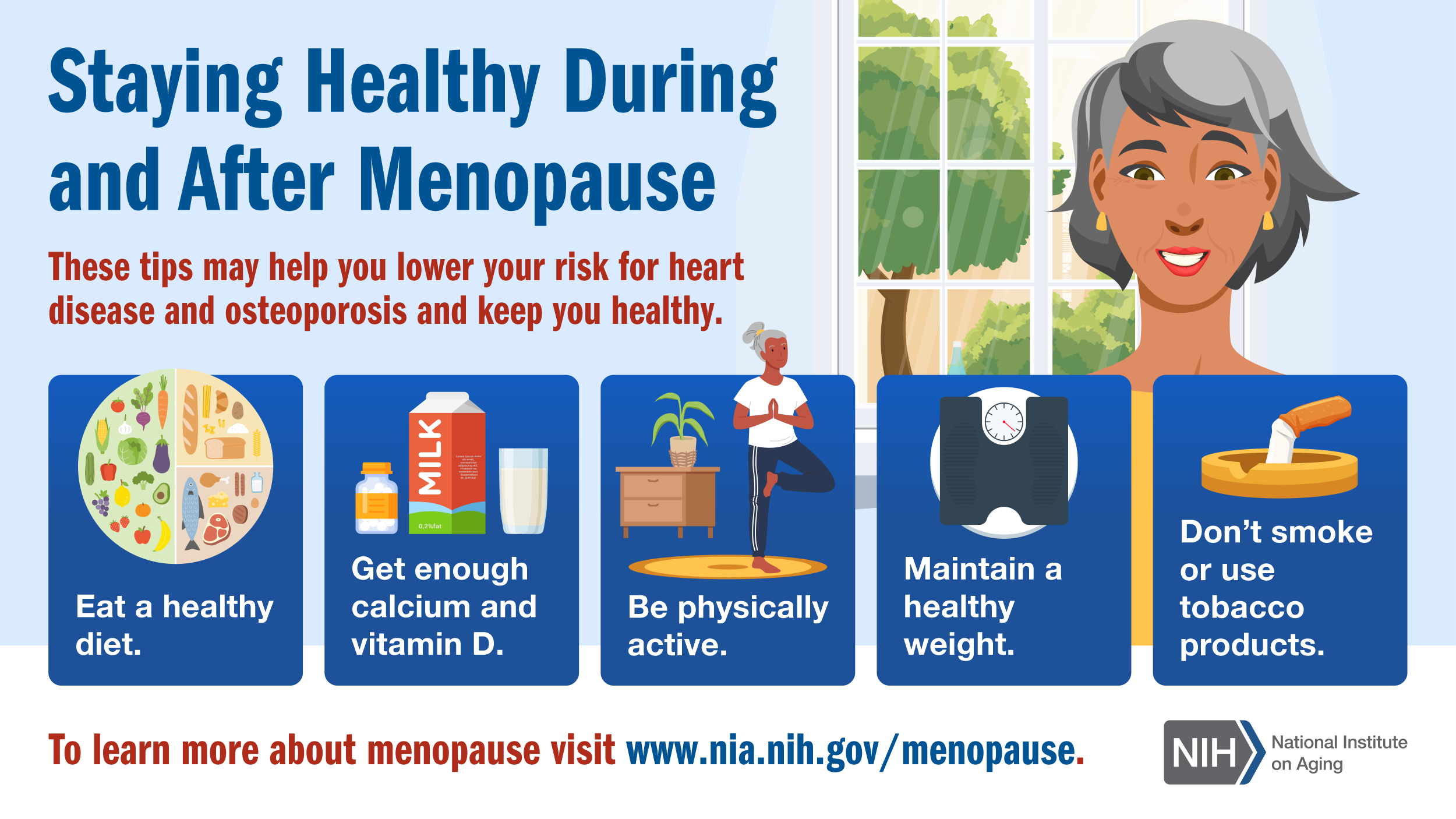
- Study Linking HRT With Dementia Risk ‘Unhelpful’
- Systematic Review and Meta-Analysis of the Effects of Menopause Hormone Therapy on Risk of Alzheimer’s Disease and Dementia
- The 2023 Practitioner’s Toolkit for Managing Menopause
- The Menopause Society Statement on Misinformation Surrounding Hormone Therapy
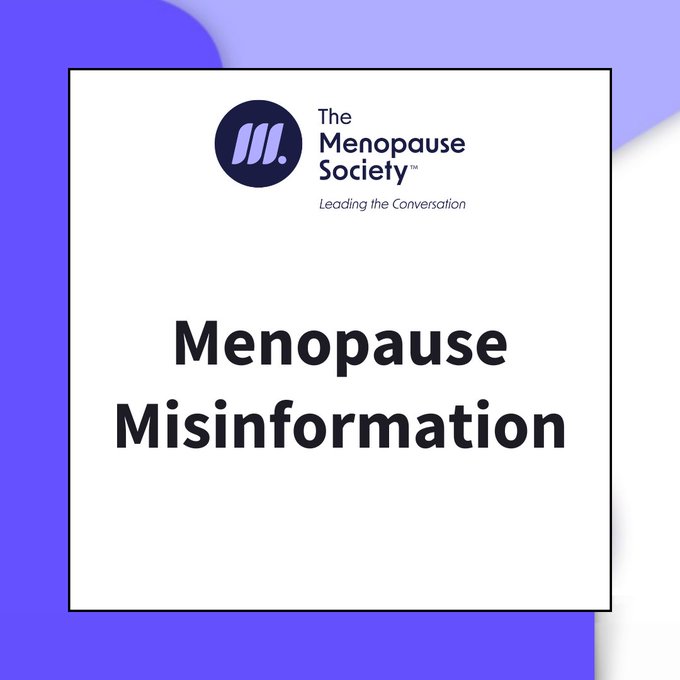
- The Role of Estrogen Therapy As A Protective Factor for Alzheimer’s Disease and Dementia In Postmenopausal Women: A Comprehensive Review of the Literature
- The Women’s Health Initiative Trials: Clinical Messages
- Treatments for Menopause
- Video & Podcast Library: Videos – World Menopause Day 2024: Menopause and Hormone Therapy: Current Perspectives and Controversies
- Videos & Podcasts: Videos – Menopause and Hormone Therapy: Current Perspectives and Controversies
- Online Events [International Menopause Society]: Past Webinars – 2025: Lifestyle Medicine
- What Is Dementia? Symptoms, Types, and Diagnosis
- When Does Perimenopause Start and How Do You Define the Beginning
- Why Is Dementia Different for Women?
- Womensbrainhealth.org [Women’s Brain Health Initiative]
- World Menopause Day 2024: Leaflet for Women – Menopause and Menopause Hormone Therapy [Multiply Languages]
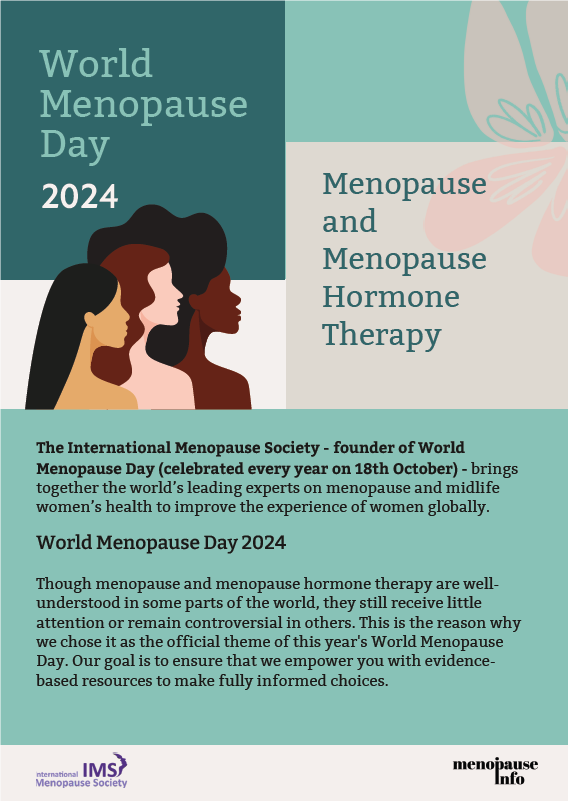
- Young Onset Dementia: Perimenopause and Menopause
Sources
Where may I find the Sources quoted?
You may find the Sources quoted at:
Sources
- Melville, M., He, L., Desai, R et al.Menopause Hormone Therapy and Risk of Mild Cognitive Impairment or Dementia: A Systematic Review and Meta-Analysis – Interpretation. December 2025 https://www.thelancet.com/journals/lanhl/article/PIIS2666-7568(25)00122-9/fulltext Accessed: 10 January 2026
- Hormones and Dementia: Does Hormone Replacement Therapy Reduce Dementia Risk? Last Reviewed: 23 December 2024. Alzheimer’s Society https://www.alzheimers.org.uk/about-dementia/risk-factors-and-prevention/hormones-and-dementia Accessed: 10 January 2026
- Melville, M., He, L., Desai, R et al.Menopause Hormone Therapy and Risk of Mild Cognitive Impairment or Dementia: A Systematic Review and Meta-Analysis – Interpretation. December 2025 https://www.thelancet.com/journals/lanhl/article/PIIS2666-7568(25)00122-9/fulltext Accessed: 10 January 2026
- Menopause and Menopause Hormone Therapy: 1. Who Is MHT For? Who Might Not Need MHT? 2024:3. International Menopause Society https://www.imsociety.org/wp-content/uploads/2024/10/2024-WMD-Leaflet_English.pdf Accessed: 10 January 2026
- Deciding About Hormone Therapy Use: Potential Risks. 2025:1. Menopause Society https://menopause.org/wp-content/uploads/default-document-library/MenoNote-Deciding-About-HT-2025.pdf Accessed: 10 January 2026







